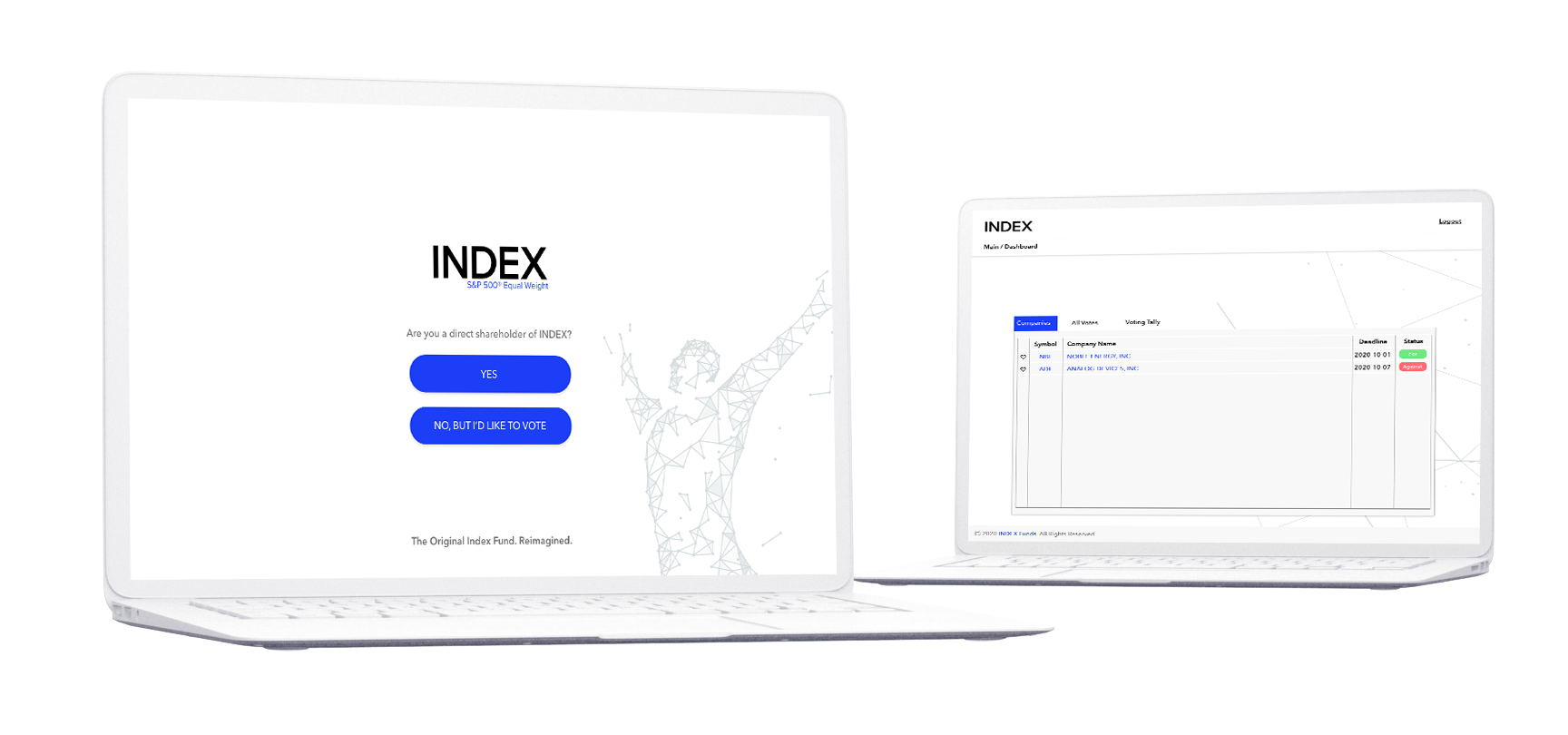Index fund investors can now weigh in on S&P 500® corporate resolutions. A landmark announcement from ONEFUND.
ONEFUND launches Index Proxy Polling for flagship fund, INDEX. An investor driven solution to the growing institutional monopoly of index funds.
December 23, 2020: ONEFUND, a private, independent FinTech company, today announced that it has added Index Proxy Polling as a shareholder feature for its S&P 500® Equal Weight index fund, ticker symbol INDEX. Index Proxy Polling enables shareholders to weigh in on important resolutions from 500 of America’s largest corporations. From Environmental, Social and Governance (ESG) matters to Big Tech censorship, index investors can now be part of the proxy process.
Index Proxy Polling was created to potentially give investors a voice and to provide an independent alternative to the growing concentration of power on Wall Street, where just 5 companies hold 90% of all index fund assets. As investors are learning, index funds strip investors of their right to vote on all proxy matters, giving that power to the fund managers. Index Proxy Polling is historic because it attempts to shift some of this power back to the shareholder.

ONEFUND seeks to democratize the industry by opening up the proxy process to index fund investors. Index Proxy Polling is a 3-step process. 1) Shareholders are polled on proxy resolutions submitted by the S&P 500® companies. 2) The shareholder results are then tallied. 3) The Investment Adviser of INDEX factors these shareholder results, among other factors, before casting the final vote.
“Who better knows the best interests of the shareholder than the shareholder themselves? Their input is vital. We think this is a transformative first step that the industry will eventually follow.” said Mike Willis, Founder of INDEX FUNDS
Two years ago, Jack Bogle warned Wall Street 1 that the near-universal popularity of index funds may reach a tipping point where they own over half of all U.S. stocks, potentially giving a handful of giant institutions voting control over virtually every large U.S. corporation. Bogle went on to say that these institutions hold such an advantage over the new entrants, that a change in this concentration was unlikely. This has been an unsolved and growing issue. Index Proxy Polling was added to INDEX at a time when tensions between giant corporations and Americans seem to be escalating. Big Tech censorship, privacy concerns, ESG practices, and diversity are proxy issues that are increasingly showing up on investor radars.
Further, there seems to be a disconnect between shareholder views and institutional voting records. For example, Morningstar’s 2019 Proxy Voting Study 2 found that BlackRock supported only 5 out of 72 proxy ballot questions addressing social and environmental concerns from companies in the S&P 500®. Additionally, a Bloomberg article 3 recently stated that in the twelve months ending August 2020, BlackRock and Vanguard “were among the least supportive” of certain environmental issues, and “while 15 out of 102 such shareholder votes passed, more than double could have done so with support from one or more of the largest three managers.” This is due to the fact that 22% of the shares of the typical S&P 500® company already sit in the portfolios of the “Big Three”, according to another Bloomberg Report4 .
The rise in popularity of ESG investing is evidence that investors are now looking beyond rate of returns when selecting investment strategies. Impact on the environment and society are other performance measurements investors seem to care about. Although ESG index funds are becoming available, many simply use negative screening methodologies, which remove companies that don’t meet their specific ESG standards. For example, both of the ESG S&P 500® ETFs currently available on the market have removed over 200 holdings from the S&P 500® Index (Source: ETFdb.com5 ). This is a 40% change in the holdings of Standard & Poor’s top 500 companies.
INDEX offers a “change vs. boycott” alternative approach for ESG investors. Instead of boycotting companies, Index Proxy Polling gives investors the opportunity to weigh in on ESG matters while owning an entire broad-based index.
“Instead of boycotting companies, why not own them and change them from the inside out? We feel Index Proxy Polling gives ESG investors the choice to buy the most popular index strategies while still having a say on ESG issues. Keep in mind, when you buy an ESG fund, you are investing in someone else’s definition of ESG, not necessarily your own.” Willis said.
ONEFUND has responded to Jack Bogle’s call to action by opening up the proxy process and giving index investors the opportunity to share their input. INDEX seeks to position itself as the independent alternative index fund for investors who no longer want their voting rights controlled by a handful of index fund giants that now dominate the industry.
“Jack Bogle talked about new entrants to the market. That is INDEX.” — Co-Founder, Todd Johnson
“We believe where you invest matters. Not all index funds are created equally.” –Founder, Mike Willis
ONEFUND
ONEFUND is a privately held FinTech company seeking to innovate the new digital Wall Street by providing investors with 1-step solutions to investing. Our flagship fund, INDEX, was launched 5 years ago and seeks to track the Equal Weight version of the S&P 500® Index before fees and expenses. (www.INDEX.fund)
S&P 500® Equal Weight Index
The S&P 500® Equal Weight Index is the equal weight version of the S&P 500® Index. It contains the same constituents as the cap-weighted S&P 500®, but each company in the S&P 500® Equal Weight Index is allocated the same weight at each quarterly rebalance. Therefore, the holdings are balanced across all of the S&P 500® companies evenly over time. Whereas, the cap-weighted S&P 500® Index over-weights the 50 largest companies with close to 50% of the holdings.
S&P 500® Attributes
Created in 1957, the S&P 500® was the first broad U.S. market-cap-weighted stock market index and has been regarded as the best single gauge of the U.S. Equities market. This world-renowned index includes 500 of the top companies in leading industries of the U.S. economy. Focusing on the large-cap segment of the market, the S&P 500® covers approximately 80% of available U.S. market capitalization.
An Exchange Traded Fund (ETF) is a type of security that involves a collection of securities—such as stocks—that often tracks an underlying index, although they can invest in any number of industry sectors or use various strategies.
ESG (Environmental, Social and Governance) investing refers to a class of investing that is also known as “sustainable investing.” This is an umbrella term for investments that seek positive returns and long-term impact on society, environment and the performance of the business.
An investor should consider investment objectives, risks, charges and expenses carefully before investing. Go to www.INDEX.fund to obtain a Prospectus which contains this and other information or call 1-844-GO-INDEX (1-844-464-6339). Read the Prospectus carefully before investing.
The Funds are not suitable for all investors.
The Funds are subject to investment risks, including possible loss of the principal amount invested.
Mutual funds, annuities, and other investments are not insured or guaranteed by the FDIC or by any other government agency or government sponsored agency of the federal government or any state, not deposits, obligations, or guaranteed by any bank or its affiliates and are subject to investment risks, including possible loss of the principal amount invested.
Ultimus Fund Distributors, LLC is the distributor for the Funds and is not affiliated with Index Funds.
The S&P 500® Equal Weight Index (the “Index”) is a product of S&P Dow Jones Indices LLC or its affiliates (“SPDJI”) and Third-Party Licensors, and has been licensed for use by ONEFUND, LLC. Standard & Poor’s® and S&P® are registered trademarks of Standard & Poor’s Financial Services LLC (“S&P”); Dow Jones® is a registered trademark of Dow Jones Trademark Holdings LLC (“Dow Jones”); [Third Party Licensor Trademarks are trademarks of the Third-Party Licensor and these trademarks have been licensed for use by SPDJI and sublicensed for certain purposes by ONEFUND, LLC]. The Index Funds S&P 500® Equal Weight is not sponsored, endorsed, sold or promoted by SPDJI, Dow Jones, S&P, their respective affiliates, or their Third-Party Licensors and none of such parties make any representation regarding the advisability of investing in such product(s) nor do they have any liability for any errors, omissions, or interruptions of the Index.
Sources:
1 https://www.wsj.com/articles/bogle-sounds-a-warning-on-index-funds-1543504551 2 https://www.morningstar.com/articles/986937/what-is-proxy-voting-and-why-you-should-care 3 https://www.bloombergquint.com/onweb/blackrock-vanguard-show-little-favor-for-shareholder-esgvotes 4 https://www.bloomberg.com/news/features/2020-01-09/the-hidden-dangers-of-the-great-indexfund-takeover 5 https://etfdb.com/index/sp-500-esg-index/#holdings&page=1
PRESS RELEASE
Company: ONEFUND
Mutual Fund: Index Funds S&P 500® Equal Weight No Load INDEX
Ticker Symbol: INDEX
Website: www.INDEX.fund
Contact: Todd Johnson
Phone: 808.600.5366

Michael Willis
Founder/CEO
